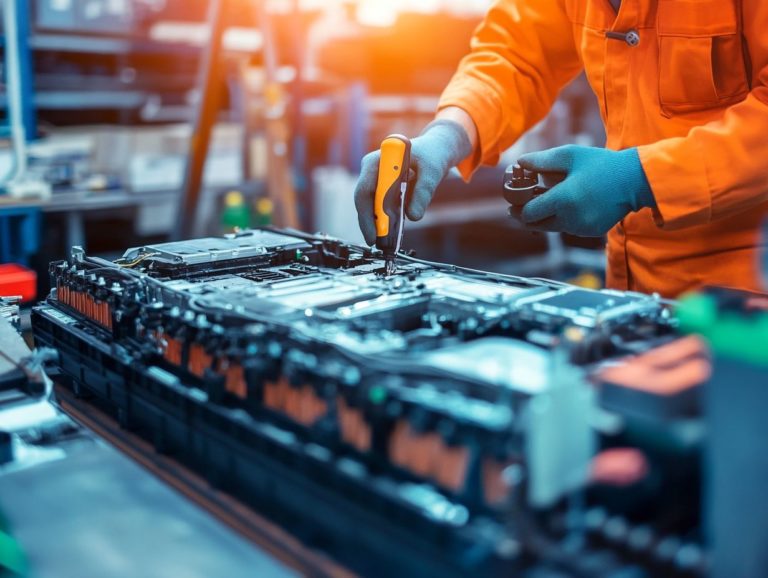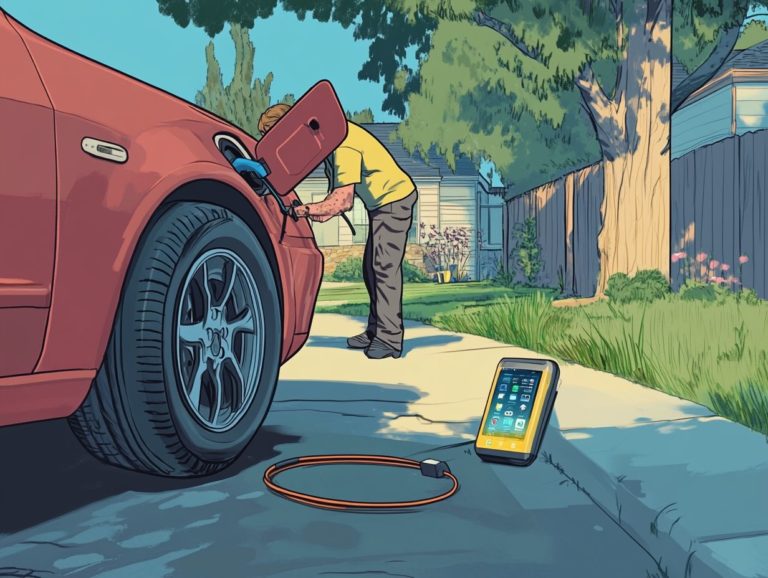5 Questions to Ask Your EV Mechanic
Want to keep your electric vehicle in top shape? Selecting the right mechanic is crucial for ensuring its longevity and optimal performance.
With more people choosing electric vehicles, specialized knowledge has never been more essential.
Here are five critical questions to pose to any mechanic before entrusting them with your EV. By inquiring about their experience, certifications, specific repair techniques, and warranty policies, you ll be empowered to make an informed decision and keep your vehicle running smoothly.
We will also explore common issues, signs that servicing is needed, and tips for battery maintenance, enabling you to drive with complete confidence.
Contents
- Key Takeaways:
- 1. How Many Years of Experience Do You Have Working with EVs?
- 2. What Certifications Do You Have for Working with EVs?
- 3. Do You Have Experience with the Specific Make and Model of My EV?
- 4. How Do You Handle EV-Specific Repairs and Maintenance?
- 5. What Is Your Warranty and Guarantee Policy for EV Services?
- What Are the Most Common Issues You See with EVs?
- Frequently Asked Questions
- 1. What experience or qualifications should I look for in an EV mechanic?
- 2. How often should I bring my EV to a mechanic for maintenance?
- 3. What should I ask during my initial consultation with an EV mechanic?
- 4. Are there any specific parts or components of an EV that require special attention from a mechanic?
- 5. Is it necessary to go to a specialized EV mechanic, or can a general mechanic work on my EV?
Key Takeaways:
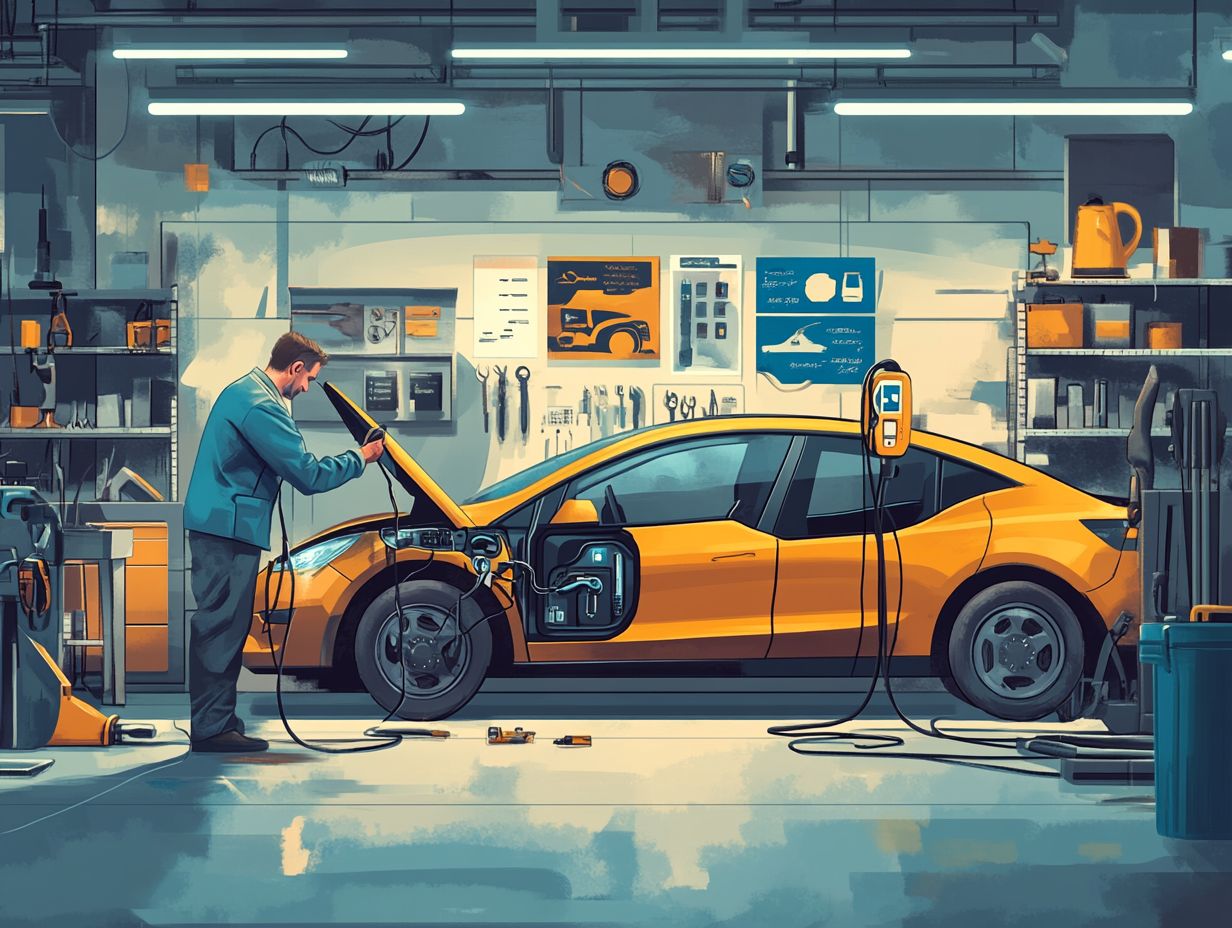
- Check the mechanic’s experience with EVs for quality service.
- Ask about relevant certifications to ensure expertise.
- Inquire about experience with your specific make and model of EV.
1. How Many Years of Experience Do You Have Working with EVs?
Experience is key to ensuring that electric vehicles (EVs) receive the proper maintenance and repairs they require. The complexities of high voltage systems that power the car and advanced diagnostic tools demand specialized knowledge that evolves with time.
Your understanding of experience should encompass not just the specific certifications and training programs technicians have undertaken but also their hands-on experience with various EV models. This practical exposure significantly enhances their ability to fix issues quickly in diverse technical environments.
As the industry continues to innovate, keeping up with ongoing education and the latest advancements in electric vehicle technology is vital. Recognizing the crucial link between extensive experience and high-quality service is essential for navigating this rapidly evolving automotive landscape.
2. What Certifications Do You Have for Working with EVs?
Certifications are essential to your qualifications as an EV technician, ensuring you adhere to safety protocols and comply with regulatory standards while working on electric vehicles.
These credentials validate your knowledge and skills and demonstrate your commitment to staying current with the latest advancements and regulatory requirements in the industry. In the fast-paced world of electric vehicles, specialized certifications like those from the National Institute for Automotive Service Excellence (ASE) instill confidence in your clients.
By having certified technicians on your team, service centers assure customers that their vehicles are in the hands of professionals skilled in managing high voltage systems and the intricate components that make up EVs. This ultimately enhances customer trust and satisfaction, elevating the overall service experience.
3. Do You Have Experience with the Specific Make and Model of My EV?
Having experience with a specific make and model of an electric vehicle such as the Tesla Model 3 or Audi E-tron is essential for ensuring accurate repairs and effective maintenance of their hardware and software components.
When technicians possess specialized knowledge about various EV models, they gain a deeper understanding of each vehicle’s unique systems and functionalities. This familiarity allows them to diagnose issues efficiently and implement targeted repairs, steering clear of unnecessary trial and error.
By honing their expertise with specific brands and models, they enhance their ability to maintain your vehicle’s performance and extend its lifespan. Such informed approaches improve reliability and optimize the energy efficiency of these innovative vehicles, ensuring you enjoy a seamless driving experience.
4. How Do You Handle EV-Specific Repairs and Maintenance?
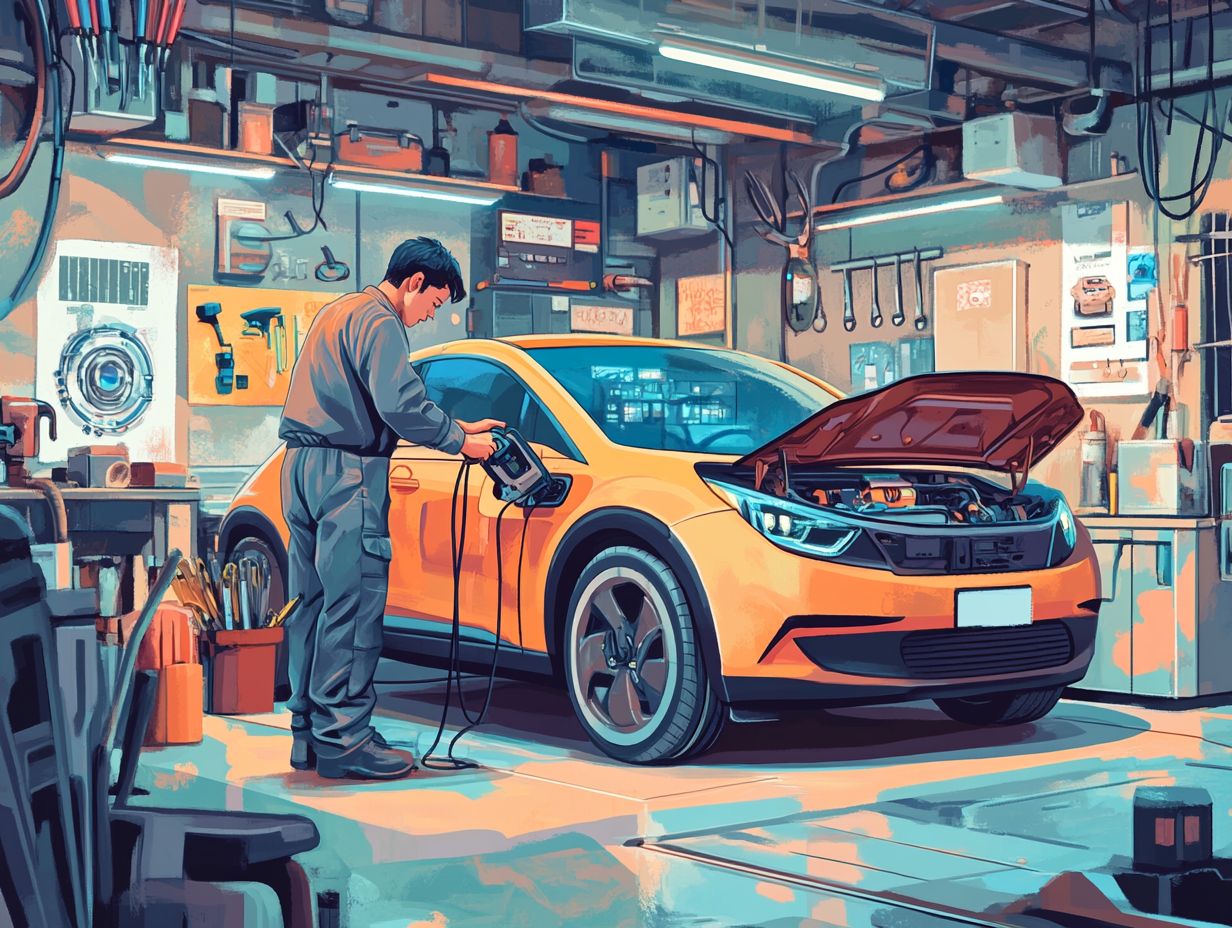
Handling EV-specific repairs and maintenance requires you to have a solid grasp of high-voltage systems, utilize specialized diagnostic tools, and adhere to routine maintenance protocols, all aimed at ensuring vehicle safety and performance.
In this intricate process, you ll first need to conduct thorough diagnostics to uncover any underlying issues, as electric vehicles often present unique challenges that differ from traditional combustion engines. Regularly scheduled software updates are essential; they not only enhance vehicle performance but also address potential security vulnerabilities, ensuring your EV operates efficiently.
You also have to consider the charging infrastructure, keeping an eye on compatibility with various charging stations and monitoring battery health, which play a critical role in your overall maintenance strategy. By addressing these aspects, you can optimize your vehicle’s longevity and sidestep costly repairs down the line.
5. What Is Your Warranty and Guarantee Policy for EV Services?
A robust warranty and guarantee policy for EV services is essential for fostering trust between you and your technician, offering you the peace of mind that any work performed will be upheld.
This assurance not only reflects the technician’s confidence in the quality of their services but also demonstrates a commitment to accountability. You can feel secure knowing that your investment is protected should any issues arise after a service.
A well-structured warranty often necessitates diligent maintenance record-keeping, which benefits both you and the technician. This documentation ensures compliance with warranty conditions and helps pinpoint specific service history, enabling technicians to address any problems effectively while you maintain your vehicle’s performance.
Ultimately, such practices strengthen the relationship between service providers and clients, promoting long-term satisfaction.
What Are the Most Common Issues You See with EVs?
Electric vehicles, while cutting-edge, come with a unique set of challenges that you, as a technician, need to be ready to tackle. Frequent diagnostics related to the EV battery pack, charging systems, and various hardware and software components can pose potential hurdles for both vehicle owners and technicians alike.
Over time, you might notice battery degradation, which can lead to reduced range and performance a significant concern for many drivers. The availability and accessibility of charging stations can also vary dramatically by location, creating anxiety for those planning long trips.
Software glitches can further complicate the user experience, affecting vehicle functionalities and connectivity features. Fortunately, you have the tools to efficiently diagnose these issues. By utilizing specialized diagnostic codes, you gain critical insights into the vehicle’s electronic systems, give the power toing you to troubleshoot and resolve problems with precision and ease.
What Are the Signs That My EV Needs Servicing?
Recognizing the signs that your electric vehicle needs servicing is crucial for maintaining its performance and longevity. You should be attentive to indicators such as warning lights, unusual sounds, and any changes in performance that might require diagnostic tools.
Keep an eye out for other warning signs like decreased battery range, odd vibrations during acceleration, or a persistent odor that could signal electrical problems. Tackling these issues promptly can save you from more severe consequences, such as expensive repairs or compromised safety features.
Regular servicing is key to preserving optimal battery health, allowing your vehicle to operate efficiently and remain reliable over time. By staying proactive about these indicators, you not only extend the lifespan of your electric vehicle but also enhance your overall driving experience.
What Are the Benefits of Regular Maintenance for EVs?
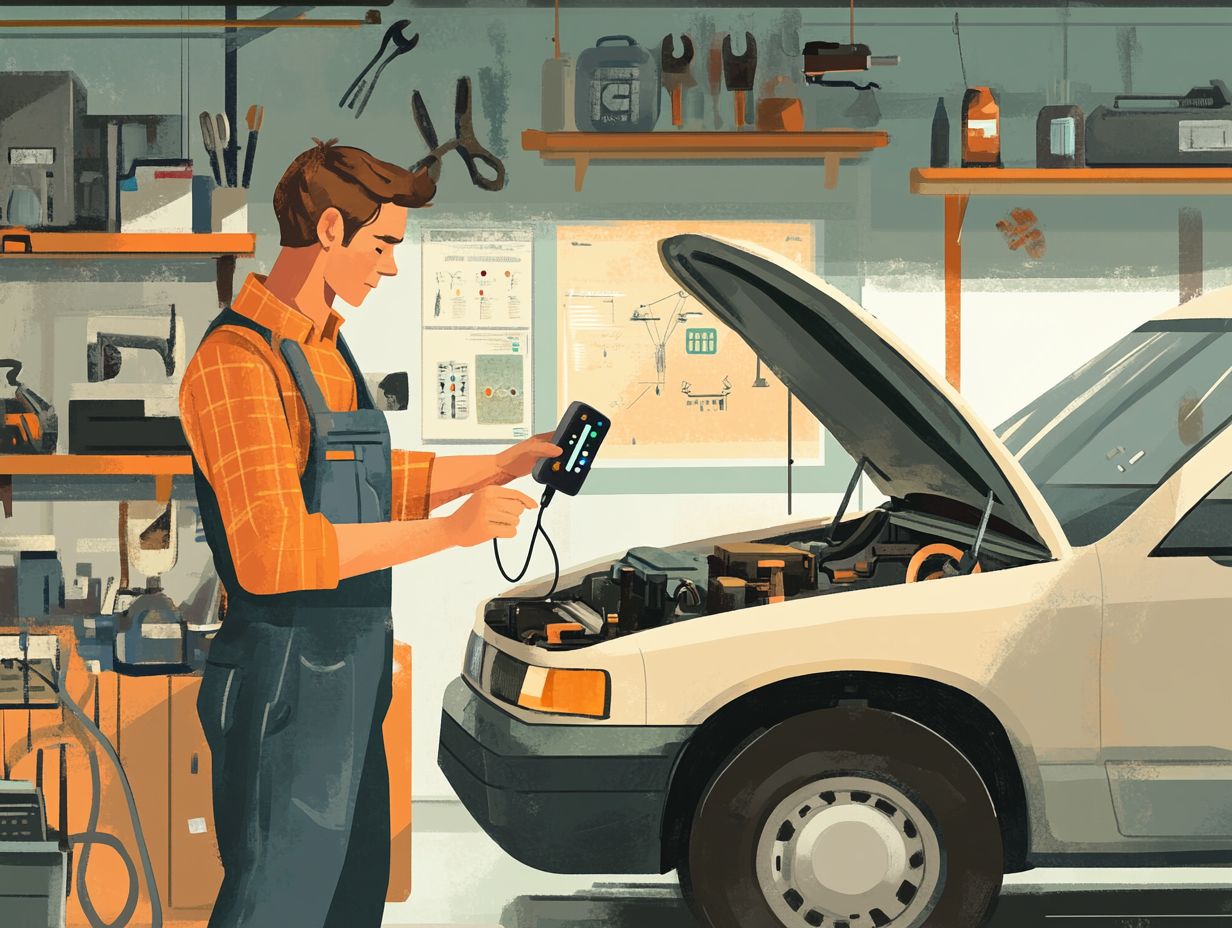
Regular maintenance of your electric vehicle is not just about enhancing performance. It also offers significant environmental advantages. By ensuring that your vehicle operates efficiently, you effectively reduce the carbon footprint linked to charging.
When you stick to a consistent upkeep routine, you re likely to experience improved battery life and extended range. This means fewer charging sessions and reduced electricity consumption. Key tasks, such as regular tire alignments, brake checks, and software updates, are essential for optimizing efficiency.
Routine inspections of the electrical systems help catch minor issues before they escalate, saving you money on potential repairs.
By taking these proactive steps, you not only diminish your environmental impact but also set the stage for long-term cost savings. In the grand scheme of things, electric vehicle ownership becomes not just a choice but a smart and sustainable investment!
How Often Should I Bring My EV in for Maintenance?
Establishing a routine maintenance schedule for your electric vehicle is essential for ensuring its longevity and optimal performance. Most recommendations suggest servicing every 6 to 12 months, depending on your usage and the manufacturer’s guidelines.
However, you might need to adjust this frequency based on several influencing factors. If you frequently navigate city traffic, your vehicle may require more attention due to the stop-and-go conditions that can affect brake wear and tire health.
If you live in an area with extreme temperatures, whether sweltering heat or freezing cold, you might notice variations in battery performance and tire durability that necessitate regular checks. Your personal driving habits, like aggressive acceleration or frequent short trips, can also contribute to higher wear and tear. Tailoring your maintenance schedule to fit your specific driving circumstances is crucial.
What Are Some Tips for Maintaining My EV’s Battery Life?
Maintaining the longevity of your EV battery pack is crucial for ensuring optimal performance and range. There are several practical tips to consider, such as proper charging techniques and minimizing exposure to extreme temperatures.
Understanding your charging behavior is key. Ideally, aim to keep your battery’s state of charge between 20% and 80%. Frequent deep discharges can accelerate wear, while overcharging can cause overheating, which may shorten your battery’s life.
Charging during moderate temperatures is essential. Extreme heat or cold can impact battery efficiency, so parking in shaded or climate-controlled areas can help stabilize conditions.
Additionally, regularly updating your vehicle’s software can optimize the battery management systems, ensuring your EV performs at its best. By adopting these habits, you can significantly enhance battery longevity, ultimately supporting your sustainable driving experience!
Frequently Asked Questions
1. What experience or qualifications should I look for in an EV mechanic?
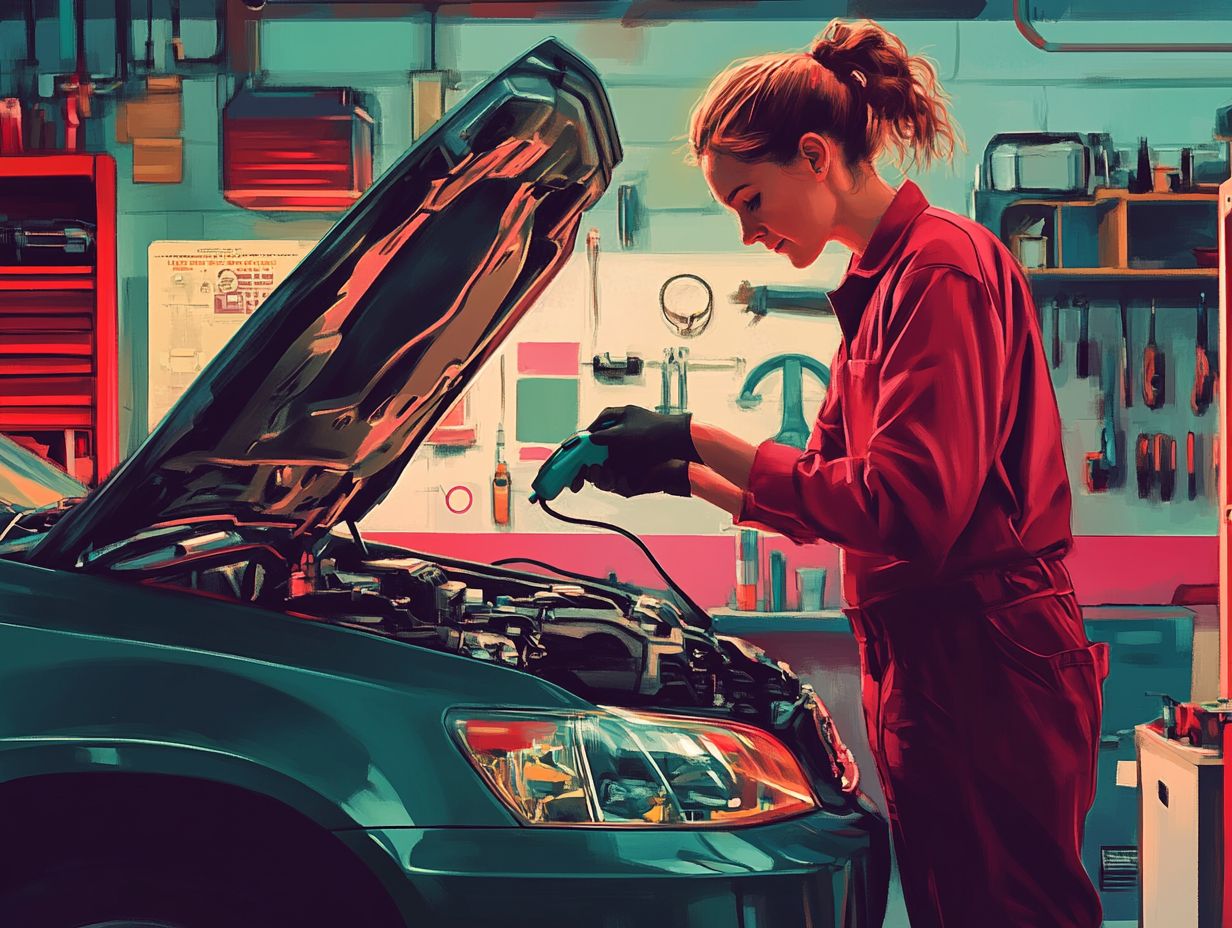
When searching for an EV mechanic, it’s important to find someone who has specific experience and training working on electric vehicles. Look for certifications or training from reputable EV manufacturers or organizations. It’s also helpful to find a mechanic who has experience working specifically on the make and model of your EV.
2. How often should I bring my EV to a mechanic for maintenance?
Just like traditional gas-powered vehicles, EVs require regular maintenance to keep them running smoothly. The recommended maintenance schedule for EVs can vary, so it’s best to follow the guidelines set by the manufacturer. Generally, it’s recommended to bring your EV in for maintenance every 10,000 to 20,000 miles.
3. What should I ask during my initial consultation with an EV mechanic?
Don’t forget to ask about the mechanic’s experience and qualifications. Inquire about the services they provide for EVs, including any quick fixes for common EV issues, as well as their warranty or guarantee.
Also, clarify any potential costs or fees related to servicing your EV.
4. Are there any specific parts or components of an EV that require special attention from a mechanic?
EVs have unique components that need specialized knowledge. Key components include the battery, electric motor, and charging system.
Ensure your mechanic is familiar with these critical aspects of your EV.
5. Is it necessary to go to a specialized EV mechanic, or can a general mechanic work on my EV?
While a general mechanic might handle some tasks, it s best to find one who focuses on electric cars. They have the training needed for the unique components of EVs.
This ensures your EV receives top-notch care and maintenance.

